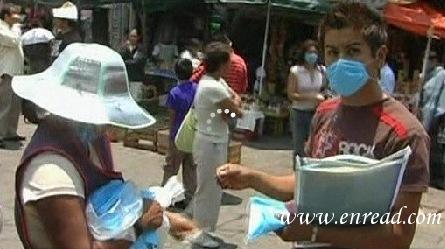| ||||||||||||||||||||||||||||||||||||||||||||||||||||||||||||||||||||||||||||||||||||||||||||||||||||||||||||||||||||||||||||||||||||||||||||||||||||||||||||||||||||||||
|
A new flu virus suspected of killing1 at least 60 people in Mexico has the potential to become a pandemic, the World Health Organization's chief says. 世界卫生组织首领说,墨西哥发现的新型感冒病毒怀疑已经使60人致死,并有可能爆发为全国性的疾病。 Margaret Chan said the outbreak was a "health emergency of international concern" and must be closely monitored. Health experts say tests so far seem to link the illnesses in Mexico with a swine flu virus in the southern US. Several people have also fallen ill in the US, and the authorities there are watching the situation. A top US health official said the strain of swine flu had spread widely and could not be contained. Speaking after a meeting of the WHO's emergency committee, Mrs Chan said that "the current events constitute a public health emergency of international concern". The WHO is advising all member states to be vigilant2(警惕的) for seasonally4 unusual flu or pneumonia(肺炎)-like symptoms among their populations - particularly among young healthy adults. Officials said most of those killed so far in Mexico were young adults - rather than more vulnerable(易受伤害的,有弱点的) children and the elderly. The committee has not recommended declaring an international public health emergency and raising the global pandemic alert level, a move that could lead to travel advisories5, trade restrictions6 and border closures. The RC church has issued advice to its priests to help halt the spread of the flu New strain At least some of the cases show a new version of the H1N1 Swine flu substrain(次代株,次代品种) - a respiratory disease(呼吸道疾病) which infects pigs. It does not normally infect humans, although sporadic7 cases(散发病例) do occur, usually in people who have had close contact with pigs. H1N1 is the same strain that causes seasonal3 flu outbreaks in humans, but the newly detected version contains genetic8 material from versions which usually affect pigs and birds. The virus is spread through coughs and sneezes and through direct and indirect contact between people. Mexican officials have confirmed 18 deaths from the virus and are investigating dozens more. Schools, museums and libraries have been closed across the capital's region and people are being urged to avoid shaking hands or sharing crockery(陶器,瓦器). All public events have been suspended, an official said. Two previously9 sold-out soccer matches were played in empty stadiums to avoid potentially spreading the virus. Health officials are isolating10 individuals suspected of having the virus and inspecting their homes. The Roman Catholic Church in Mexico has recommended measures to avoid further contagion11(传染,蔓延) at Mass this Sunday. Priests(教士,神父) have been told to place communion(恳谈) wafers(圆片) in the hands of worshippers rather than in their mouths and to suggest to the congregation(集合,会和) that kissing or shaking hands be avoided during the service. 'Caution' In the US, 11 people are now known to have been infected with the new strain - seven people in California, two in Texas, and two in Kansas. There are also eight suspected cases in New York City after 200 students at a high school fell ill. Specimens12 were taken from nine students, and eight were determined13 to be probable cases of swine flu, said city health commissioner14 Dr Thomas Frieden. Those samples are now being examined by the US Centers for Disease Control and Prevention (CDC). No children had required hospital treatment and many had fully15 recovered, said Dr Frieden, but the school could remain closed out of "an abundance of caution". He urged people to maintain basic hygiene16(卫生), such and covering their mouths when coughing and sneezing, washing hands regularly and keeping surfaces clean. Dr Frieden said most people would not need to take antiviral(抗原体的,抗病毒的) medication(药物治疗,医药) if they fell ill, unless they had an underlying17 medical condition. Hopeful sign CDC officials have said that with cases arising in so many communities, containment18(容积,控制) is unlikely to be feasible(可行的,可能的). There is currently no vaccine19(疫苗) for the new strain. Tom Skinner of the CDC told the BBC that as efforts to detect the virus increased, it was not surprising that more cases were being identified and that "severe" cases could be expected. But he said it was too early too tell how widespread the impact would be. "We don't know how well or efficiently20 this virus is spreading and how easily it is going to be sustained(持久的) in the human population," he said. "Those are questions we have to answer before we're really able to tell what the ultimate impact on public health might be." Mr Skinner said it was not yet clear which side of the border the virus had originated. But he said the US was likely to take "normal and routine" steps within the next few days to screen passengers coming into the US and to distribute information. The CDC plans to send experts to Mexico to help investigate the virus which has infected more than 1,000 people in the country. The BBC science editor Susan Watts21 says the new strain is a classic "re-assortment(分类 ,配合)" - a combination feared most by those watching for the flu pandemic. 点击  收听单词发音 收听单词发音
|
||||||||||||||||||||||||||||||||||||||||||||||||||||||||||||||||||||||||||||||||||||||||||||||||||||||||||||||||||||||||||||||||||||||||||||||||||||||||||||||||||||||||
- 发表评论
-
- 最新评论 进入详细评论页>>





